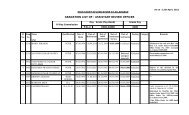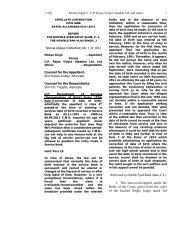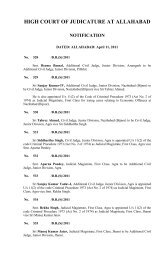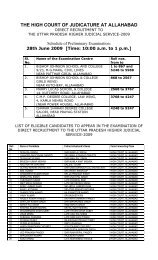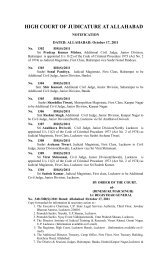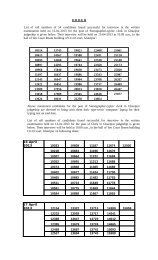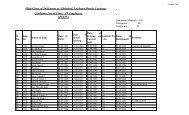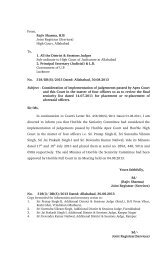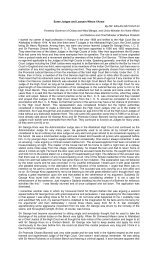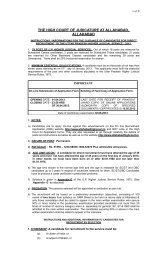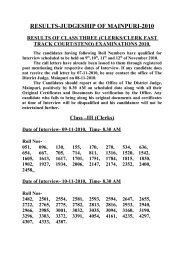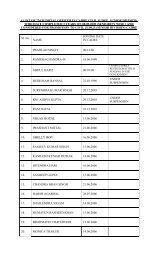Nov - High Court of Judicature at Allahabad
Nov - High Court of Judicature at Allahabad
Nov - High Court of Judicature at Allahabad
You also want an ePaper? Increase the reach of your titles
YUMPU automatically turns print PDFs into web optimized ePapers that Google loves.
1066 INDIAN LAW REPORTS ALLAHABAD SERIES [2009<br />
things, then anything not mentioned is<br />
excluded. The aforesaid well-known<br />
maxim was described as a principle <strong>of</strong><br />
logic and commonsense and not merely a<br />
technical rule <strong>of</strong> construction. Reference<br />
may be had to the decision in the case <strong>of</strong><br />
B. Shankara Rao Badami Vs. St<strong>at</strong>e <strong>of</strong><br />
Mysore, [1969 (1) SCC 9] and followed<br />
in Union <strong>of</strong> India Vs. Tulsiram P<strong>at</strong>el<br />
[(1985) 3 SCC 398] [paragraph 70].<br />
53. In our opinion, the aforesaid<br />
principle squarely applies in the present<br />
context and for the reasons given<br />
hereinabove and hereinafter, we would<br />
interpret Regul<strong>at</strong>ion 31 read with<br />
Regul<strong>at</strong>ion 100 to mean th<strong>at</strong> the sanction<br />
<strong>of</strong> prior approval in respect <strong>of</strong> the<br />
termin<strong>at</strong>ion <strong>of</strong> a Class-IV employee<br />
would stand excluded. The reasoning<br />
given by the learned Single Judge in Daya<br />
Shanakar Tiwari (supra) to th<strong>at</strong> extent<br />
does not lay down the law correctly and,<br />
therefore, its approval by the Division<br />
Bench in the case <strong>of</strong> Principal Rashtriya<br />
Inter College, (supra) also cannot be said<br />
to be laying correct law.<br />
54. There is yet another reason to<br />
come to this conclusion, which has also<br />
been taken note <strong>of</strong> in the case <strong>of</strong> Pujari<br />
Yadav (supra). The provision <strong>of</strong> appeal<br />
against an order <strong>of</strong> termin<strong>at</strong>ion passed by<br />
the Head <strong>of</strong> the Institution lies to the<br />
Committee <strong>of</strong> Management. The order <strong>of</strong><br />
the Committee <strong>of</strong> Management can be put<br />
in jeopardy in a further appeal before the<br />
District Inspector Schools. The hierarchy<br />
so provided, therefore, clearly amplifies<br />
the intention <strong>of</strong> the legisl<strong>at</strong>ure th<strong>at</strong> a<br />
Class-IV employee would have the<br />
benefit <strong>of</strong> appeals to the higher authorities<br />
<strong>at</strong> two stages. If a prior approval or<br />
sanction was intended before the<br />
punishment to be awarded, then the<br />
District Inspector <strong>of</strong> Schools would be<br />
supposed to go into the merits <strong>of</strong> such a<br />
punishment. Th<strong>at</strong> is the purpose for a<br />
prior approval or sanction, which requires<br />
the sanctioning authority to examine an<br />
order <strong>of</strong> punishment in depth before<br />
proceeding to grant sanction. It is for this<br />
reason th<strong>at</strong> Regul<strong>at</strong>ion 37 quoted<br />
hereinabove, makes it imper<strong>at</strong>ive for the<br />
punishing authority to send all documents<br />
including reports to the Inspector <strong>of</strong><br />
Schools for approval.<br />
55. There is yet another reason to<br />
come to the same conclusion. Regul<strong>at</strong>ion<br />
37 specifically excludes for sending <strong>of</strong><br />
any such report to the Inspector in the<br />
case <strong>of</strong> Class-IV employees and all<br />
proceedings in rel<strong>at</strong>ion to Regul<strong>at</strong>ion 37<br />
have to be undertaken by the appointing<br />
authority. The aforesaid st<strong>at</strong>utory<br />
provision, therefore, does not allow the<br />
sending <strong>of</strong> any such documents to the<br />
Inspector in the case <strong>of</strong> Class-IV<br />
employees. It injuncts the sending <strong>of</strong> any<br />
such papers to the District Inspector <strong>of</strong><br />
Schools for examin<strong>at</strong>ion. In our opinion,<br />
the intention <strong>of</strong> the legisl<strong>at</strong>ure is clear<br />
enough th<strong>at</strong> the District Inspector <strong>of</strong><br />
Schools is not required to examine the<br />
m<strong>at</strong>erial on the basis where<strong>of</strong> any<br />
punishment has been awarded to a Class-<br />
IV employee. To our mind, there is no<br />
purpose to seek prior approval or sanction<br />
when the Inspector cannot examine the<br />
documents, which are necessary for<br />
granting such sanction. To interpret it<br />
otherwise, would be to do viol<strong>at</strong>ion to the<br />
procedure, which specifically st<strong>at</strong>es th<strong>at</strong><br />
all proceedings in this regard have to be<br />
performed by the appointing authority,<br />
namely the Head <strong>of</strong> the Institution. If we<br />
interpret the provisions making it<br />
compulsory to obtain a sanction, then the<br />
aforesaid procedure as engrained in



